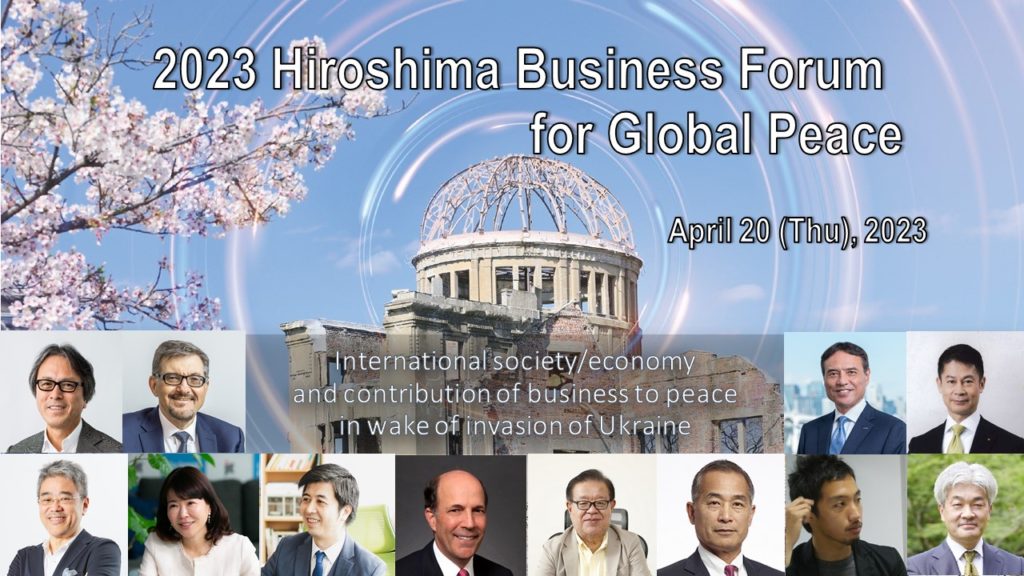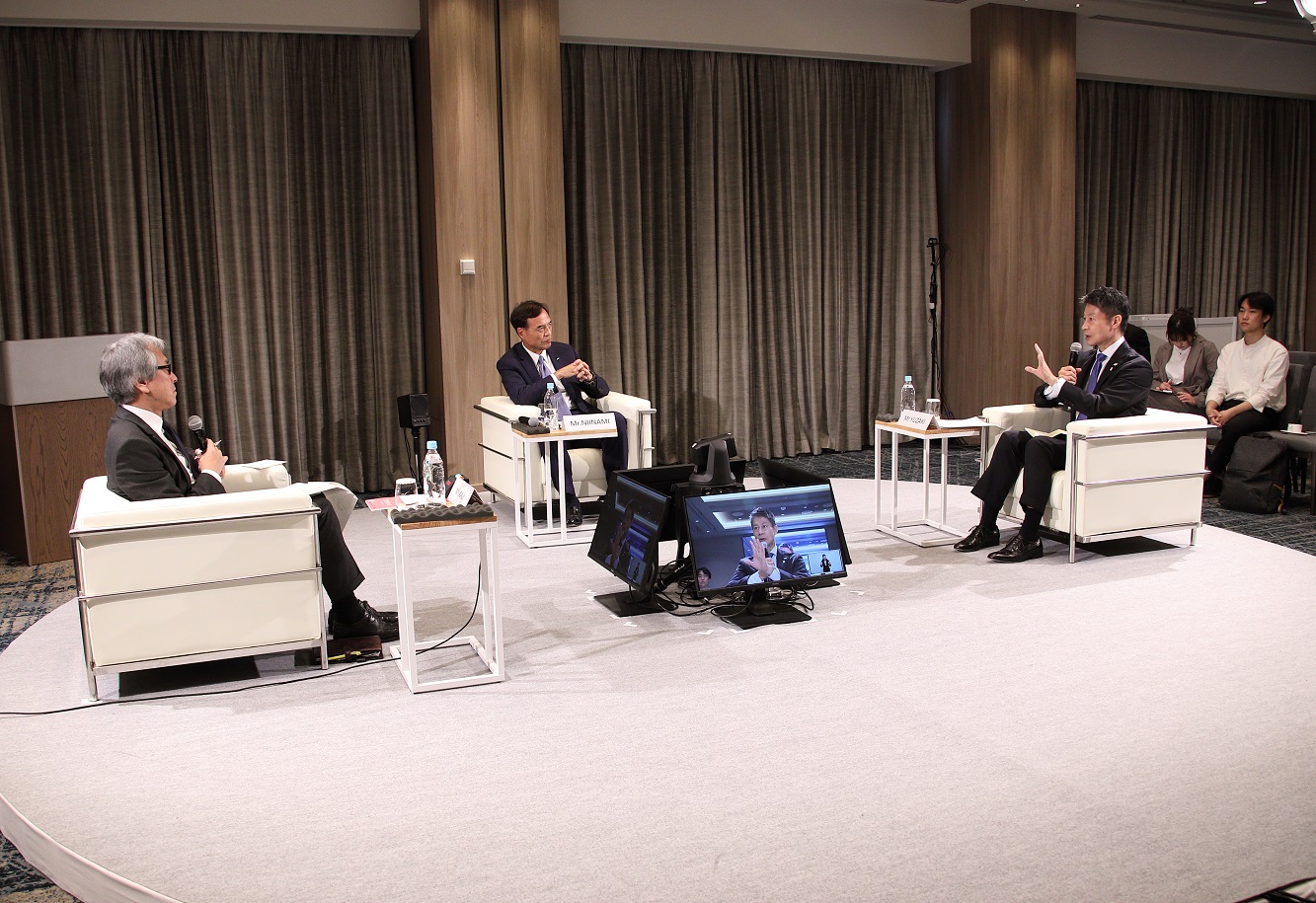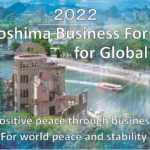Results from the 2023 Hiroshima Business Forum for Global Peace
International society/economy and contribution of business to peace in wake of invasion of Ukraine

Hiroshima Business Forum for Global Peace
The forum aims to contribute to the realization of a truly peaceful and sustainable global community by serving as a business platform where participants reaffirm and share with each other the importance of world peace, review the roles of entities such as businesses and NGOs, and multilaterally discuss the relationship between business and ways of promoting peace.
The World Business Conference for World Peace was initially in 2013 and it was renamed to the Hiroshima Business Forum for Global Peace in 2020(75 years since the atomic bombing ) to make a new start, and the 2023 forum was the 8th forum of its kind.
Date:April 20 (Thu), 2023 13:00-17:15
Organization: Hiroshima Organization for Global Peace (HOPe)
Venue:Hilton Hiroshima (11-12 Fujimicho, Naka Ward, Hiroshima)
Held in Hybrid(Online and On-Site)
Opening
.png) (Governor)
(Governor)
Two years from now will be the 80th year since the end of World War II and of the dropping of the atomic bomb. As we look ahead toward the 100th year, it will become increasingly important for us to work together with the economic community in order to build a truly sustainable world. And we need a leader from the business world who will serve as its face in order for us to be able to send out messages on peace in a way that has impact. As such, we requested the presence of Mr. Niinami, who has been appointed Chairman of the Japan Association of Corporate Executives.- (Mr. Niinami)
The framework of deterrence, which was built by the international community over the past 30 years after the Cold War and was believed to have been functioning, has been made irrelevant by Russia’s invasion into Ukraine. We cannot turn our backs on this reality, and must face this issue head on. The key is in having Japan be considered by everyone as being a good country and an essential country.
| NIINAMI Takeshi | Chief Executive Officer, SUNTORY HOLDINGS LIMITED |
| YUZAKI Hidehiko |
President of Hiroshima Organization for Global Peace (HOPe) |
【Keynote Speech】 “21st century challenges posed by the war in Ukraine – nuclear, cyber, economic security, information, and democracy”
-300x201.png) Among the countries that were a part of the former Soviet Union, Ukraine comes second after Russia in the size of its population and economy. And as the world becomes increasingly multipolar divided between the United States, the European Union, Russia, and China, President Putin wanted Russia to take on the role of the former Soviet Union and rule by the commonwealth method, which he believed cannot be realized without gaining control over Ukraine. This is the reason behind this war.
Among the countries that were a part of the former Soviet Union, Ukraine comes second after Russia in the size of its population and economy. And as the world becomes increasingly multipolar divided between the United States, the European Union, Russia, and China, President Putin wanted Russia to take on the role of the former Soviet Union and rule by the commonwealth method, which he believed cannot be realized without gaining control over Ukraine. This is the reason behind this war.- The nuclear element was present from the beginning of the war, as Russia occupied the Chernobyl Nuclear Power Plant and the Zaporizhzhya Nuclear Power Plant. The world as a whole is not prepared for this risk.
- We do not know when this war will end, but the relationship between the two countries will not improve even after the war ends, and it is unlikely that there will be any immediate changes in trade relations between Russia and Europe.
- Russian trade, which formerly focused on Europe, has shifted to India and China. Russia started supplying energy to Europe in the 1970s, but what we are faced with right now is the beginning of the end of this supply. Germany is moving away from its reliance on nuclear power, and France is striving to break away from fossil fuel. However, these shifts won’t be happening immediately, and the changes will likely take place over a long period of time.
- Mark Twain said, “History doesn’t repeat itself, but it often rhymes.” We have the experience of having overcome the Cold War. We must look back at the past and not only study what we did wrong at the time, but also think about what we should correct in order to prevent nuclear wars and atomic conflicts from ever happening again.
- As during the period of the Cold War, my hope is to see business leaders serving a significant role in this new environment.
| Serhii Plokhy | Professor of History, Director, Ukrainian research Institute, Harvard University |
【Session 1】“The importance of information for peace and the role of information companies”
 From the perspective of journalism, we are faced with the following issues: the spread of fake news and the information environment regarding Ukraine; the credibility of the media and the government; and the development of rules on generative AI, etc.
From the perspective of journalism, we are faced with the following issues: the spread of fake news and the information environment regarding Ukraine; the credibility of the media and the government; and the development of rules on generative AI, etc.- It is not easy to define a healthy information space. Freedom of expression is important; however, there is also the problem of security. We need to strike a balance between the two.
- Japan has low fluidity of human resources, with a division between the public and the private sectors. A similar trend can be seen in journalism as well. Meanwhile, the United States, which has a high level of fluidity, is able to understand different values and adopt perspectives that are seen from the outside. It is important for Japan to create a society with high fluidity.
- Japan does not have a regulatory authority for the media, so there are limited measures that can be taken against fake news and disinformation. Japan has been placing value on voluntary discipline practiced by the general public, but measures being implemented by the public are not up to speed, with a lack of receptacles for dealing with fake information. We need to implement measures that include literacy education, for which private companies should also share in having social responsibility.
- With regards to generative AI, while there are optimistic opinions about how it will become a tool for overcoming the language barrier, it also has the potential to create a major problem and must be looked upon with caution. What is important with AI is to have transparency. In particular, policy decision makers and business leaders need to approach generative AI based on having a correct understanding about it.
- Looking back at history, we need to focus on the infinite possibilities brought on by technology. We hope that the G7 Hiroshima Summit will encourage the development of basic materials created with a high level of transparency, acquire trust by fulfilling accountability, and send out wonderful messages to the world so that we will have the use of even better technologies.
| NISHIDA Ryosuke【Moderator】 | Associate Professor,Institute for Liberal Arts, Tokyo Tech |
| MURAI Jun | Distinguished Professor, Keio University |
| John V. Roos |
Founding Partner, Geodesic Capital Former U.S. Ambassador to Japan |
| SEO Masaru | President, SlowNews.inc |
【Session 2】“How to tackle the weaponization of economics (energy, food, etc.)”
 Developed countries are all fiercely vying to acquire the supply capacity for leading semiconductors. Our societies previously placed importance on efficiency, but we are now moving into an era where national policies are being developed by balancing future risks against today’s sacrifices. Companies need to understand that they will be affected by such policies, and while we are in this transitional period, they need to increase strategic options as much as possible while postponing decision-making on major issues.
Developed countries are all fiercely vying to acquire the supply capacity for leading semiconductors. Our societies previously placed importance on efficiency, but we are now moving into an era where national policies are being developed by balancing future risks against today’s sacrifices. Companies need to understand that they will be affected by such policies, and while we are in this transitional period, they need to increase strategic options as much as possible while postponing decision-making on major issues.- In looking at the relationship between governments and companies in terms of economic security, what becomes crucial is to possess technological intelligence that support political leadership. Thus, companies need to strengthen such technological intelligence and form partnerships with the governments.
- The Ukraine crisis has clearly shown that there will be fierce competition to acquire liquid natural gas, with a wide gap between supply and demand for some time to come. In this transitional period on energy, the difficulty lies in the fact that even if there is an easing of the dynamic changes that are taking place right now, it will still not resolve the root of the problem.
- It takes a very long time to replace the energy infrastructure; thus, in order to improve the energy self-sufficiency rate and ensure a means of self-defense, it is extremely important that we hold realistic discussions on energy policies, and require an even stronger involvement by the government. Furthermore, energy literacy must also be enhanced.
- More than 50% of our source for food energy is reliant on wheat, rice, and corn. In particular, we are dependent on the two countries of Russia and Ukraine for wheat and corn. Now that those crops cannot be freely distributed, there is a sharp rise in food prices, causing extreme difficulties for socially weak countries.
- We are seeing increasingly sharp disparities within the country. Our previous common wisdom was based on the belief that peace comes with an open market, but when we leave things up to the market, the winners continue to win and the losers continue to lose. This is a phenomenon seen in every country, and we will not be able to narrow the gap without political intervention of the economy.
- When we have a growth strategy to aim for, it is essential that we also think of a Plan B to deal with its risks. And we must have a solid understanding that preparing for a Plan B entails costs. This refers not only to tangible economy such as energy and food, but also for the digital economy.
|
TAKASHIMA Kohey |
Representative Director,CEO Oisix ra daichi Inc. |
|
KOSHIBA Nobu |
Chairman Emeritus, JSR Corporation |
| SUZUKI Kazuto |
Professor at the Graduate School of Public Policy at the University of Tokyo Director of the Institute of Geoeconomics at International House of Japan |
| TAKEUCHI Sumiko | Member, Board of Directors of IEEI Co-President of U3Innovations, LLC |
Closing
 (Mr. Niinami)
(Mr. Niinami)
The role of Japan in order to build a peaceful society is to not only deepen our relationship with the United States but to also strengthen our relationships with the Global South. We need to work more closely together with such countries in areas that are essential to our livelihood, such as food and medicine, which will be important in overcoming this transitional period. It is extremely significant that we communicate such messages from Hiroshima, which has a history of having overcome a tragic experience. In this situation, the Japanese business world hopes to serve the role of building a band of trust in performing our corporate activities.- (Governor)
Humans have the power to cause destruction, but we can also create prosperity based on a foundation of peace. Hiroshima is a place where people can learn about both. In this sense, there is great significance in hosting the G7 in Hiroshima. We wish to send out a message about the importance of the business community in fulfilling their role to help build a peaceful world. - (Mr. Niinami)
The year 2025 will mark the 80th year since the end of World War II. I hope that world leaders, both those who share the same opinions as well as those who have different ideas, will participate in the conference and partake in lively debates as we make an appeal on the importance of peace. I will also work together with everyone so that the 2025 conference will be a major success.
| KAJI Yoshimitsu | Chairman & CSDO (Chief Sustainable Development Officer), Cinnamon AI (Cinnamon Inc.),Lumada Innovation Hub Senior Principal, Hitachi, Ltd. Kamakura Smart City Architect |
| NIINAMI Takeshi | Chief Executive Officer, SUNTORY HOLDINGS LIMITED |
| YUZAKI Hidehiko |
President of Hiroshima Organization for Global Peace (HOPe) |
Previous Conferences
2022Hiroshima Business Forum for Global Peace (September, 2022)
2021Hiroshima Business Forum for Global Peace (September, 2021)
2020Hiroshima Business Forum for Global Peace (August, 2020)
2019 World Business Conference for World Peace (October, 2019)
2018 World Business Conference for World Peac (November, 2018)
2016 World Business Conference for World Peace (October, 2016)
Tags associated with this article







